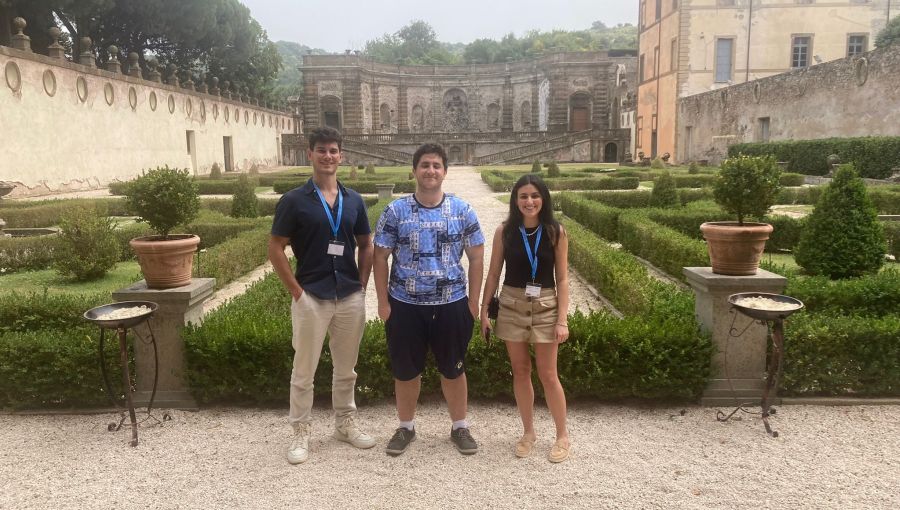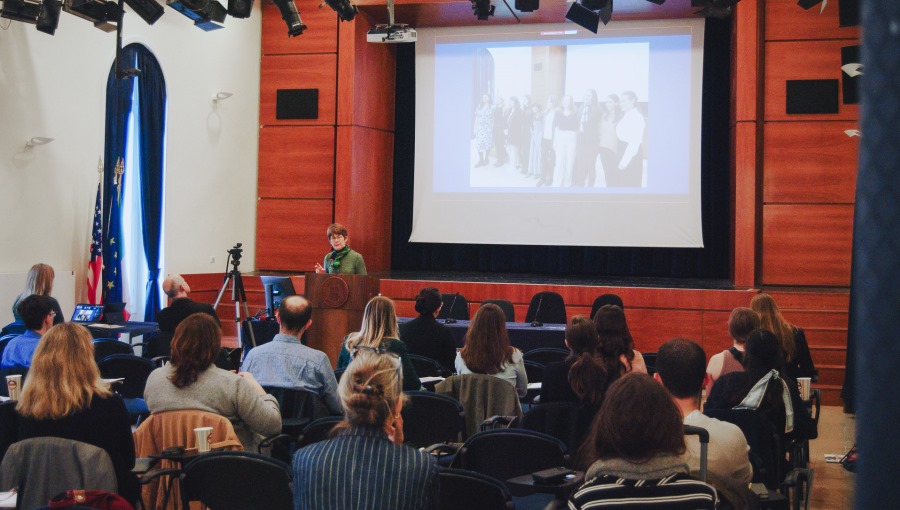JCU Students Participate in FESCAAAL Film Festival Award Ceremony in Milan
On March 25, 2023, a delegation of eight JCU students traveled to Milan to attend the closing ceremony of the 32nd edition of Festival del Cinema Africano, d’Asia e America Latina (FESCAAAL), a film festival organized by Centro Orientamento Educativo, an NGO involved in international cooperation.

The JCU Delegation at FESCAAAL (photo by Davide Secchi)
On March 15, two organizing members of FESCAAAL came to JCU to introduce the festival and screened the films running in the Extr’A category, consisting of short films by Italian directors about one of the three regions represented at the festival (Africa, Asia, Latin America). In preparation for the visit, the eight JCU students had formed a jury to award the John Cabot University prize to one of the films. One student was selected from each of JCU’s cultural clubs (Nada El Kady from the Arab Student Association, Maiya Decena Chin from the Asian Culture Club, Sabrina Valori from the Black and African Student Association, and Alejandro Martinez Ladron De Guevara from the Organization of Latin American Cultures), along with Rachel Cramer from the Film Appreciation Group, and Temashengu Litchfield-Tshabalala, Lily Tooman, and Laurel De Pasquale from Communications Professor Donatella Della Ratta’s Post-Colonial Cinema class.
The John Cabot University Award went to the Battima (2022) by Federico Demattè. The synopsis of the film states: “On the Lazio coast of Coccia di Morto, Kimutai, a young African, is enjoying the sun on the beach. The illusion of spending a day like everyone else is suddenly interrupted by a trivial misunderstanding; a chain of mistakes and mix-ups with the bathers will make Kimutai find a new barycenter in the precarious balance between reality and illusion.”
“The subtlety in delivering the message of racial prejudice is the magic in Battima,” said Communications and English Literature double-major Temashengu Litchfield-Tshabalala upon conferring the award on stage. “Without exploiting or glorifying black pain, Battima shows the experience of blackness in a monoracial, mono-ethnic society. The protagonist Kimutai attracts attention to himself simply by existing. A conversation on alienation and hyper-visibility is brought to the audience, which is left wondering what the price of blackness in spaces where it does not belong is,” she added.
The partnership between FESCAAAL and John Cabot University came from an idea of Student Cultural Programs and Activities Coordinator Giulia Ricci, who organized and chaperoned the trip along with Student Activities Coordinator Federica Bocco, with the support of the Student Services Office and the President’s Office, and the contribution of the Communications Department. “This partnership is very important and enriching for a multicultural community such as John Cabot University,” said Ricci. Participating in the festival as a special jury was an empowering experience for our students who breathed the atmosphere of an international festival such as FESCAAAL that speaks of diversity, inclusion, and the hope of returning to a solid connection between human beings.”
“We all had such a tough time deciding on a winner,” said visiting student Laurel De Pasquale. “All of us were impacted by and related to the films in different ways, and were truly impressed by them.”
“The FESCAAAL film festival was a memorable experience that inspired cross-cultural conversations and reflections on films that are more removed from the mainstream themes the media is saturated with,” commented International Affairs student Lily Tooman. “The films resonated with pressing social, political, and environmental issues and their different incarnations throughout time and that require new perspectives to approach them.”
Says Director of Student Services Pilar Murguia, “We hope to make this a long-lasting collaboration and to participate in the festival and more cultural events in the future, in order to offer JCU students more opportunities to have an active role in contributing, even in small part, to making Italy a more multicultural place.”





